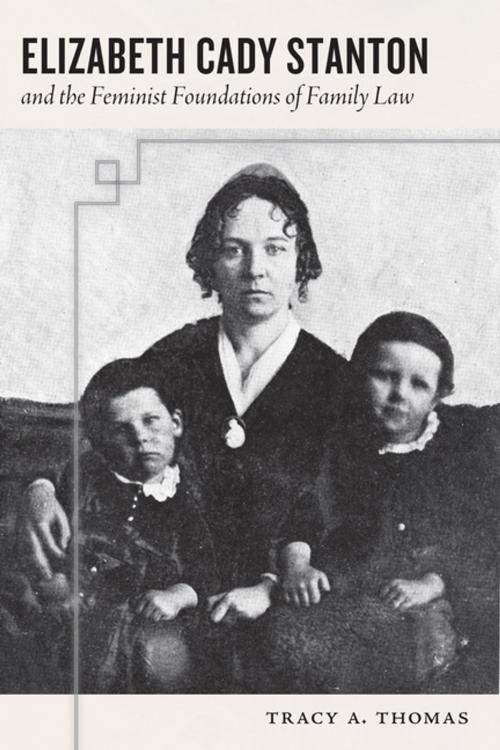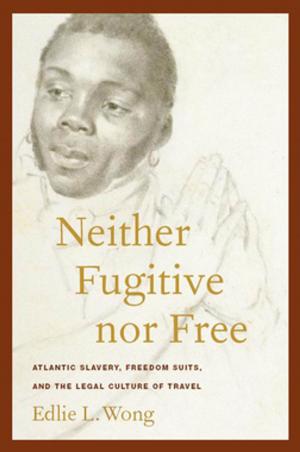Elizabeth Cady Stanton and the Feminist Foundations of Family Law
Nonfiction, Reference & Language, Law, Legal History, Social & Cultural Studies, Social Science, Gender Studies, Women&| Author: | Tracy A. Thomas | ISBN: | 9781479876815 |
| Publisher: | NYU Press | Publication: | November 29, 2016 |
| Imprint: | NYU Press | Language: | English |
| Author: | Tracy A. Thomas |
| ISBN: | 9781479876815 |
| Publisher: | NYU Press |
| Publication: | November 29, 2016 |
| Imprint: | NYU Press |
| Language: | English |
Thomas Byers Memorial Outstanding Publication Award from the University of Akron Law Alumni Association
Much has been written about women’s rights pioneer Elizabeth Cady Stanton. Historians have written her biography, detailed her campaign for woman’s suffrage, documented her partnership with Susan B. Anthony, and compiled all of her extensive writings and papers. Stanton herself was a prolific author; her autobiography, History of Woman Suffrage, and Woman’s Bible are classics. Despite this body of work, scholars and feminists continue to find new and insightful ways to re-examine Stanton and her impact on women’s rights and history.
Law scholar Tracy A. Thomas extends this discussion of Stanton’s impact on modern-day feminism by analyzing her intellectual contributions to—and personal experiences with—family law. Stanton’s work on family issues has been overshadowed by her work (especially with Susan B. Anthony) on woman’s suffrage. But throughout her fifty-year career, Stanton emphasized reform of the private sphere of the family as central to achieving women’s equality. By weaving together law, feminist theory, and history, Thomas explores Stanton’s little-examined philosophies on and proposals for women’s equality in marriage, divorce, and family, and reveals that the campaigns for equal gender roles in the family that came to the fore in the 1960s and ’70s had nineteenth-century roots. Using feminist legal theory as a lens to interpret Stanton’s political, legal, and personal work on the family, Thomas argues that Stanton’s positions on divorce, working mothers, domestic violence, childcare, and many other topics were strikingly progressive for her time, providing significant parallels from which to gauge the social and legal policy issues confronting women in marriage and the family today.
Thomas Byers Memorial Outstanding Publication Award from the University of Akron Law Alumni Association
Much has been written about women’s rights pioneer Elizabeth Cady Stanton. Historians have written her biography, detailed her campaign for woman’s suffrage, documented her partnership with Susan B. Anthony, and compiled all of her extensive writings and papers. Stanton herself was a prolific author; her autobiography, History of Woman Suffrage, and Woman’s Bible are classics. Despite this body of work, scholars and feminists continue to find new and insightful ways to re-examine Stanton and her impact on women’s rights and history.
Law scholar Tracy A. Thomas extends this discussion of Stanton’s impact on modern-day feminism by analyzing her intellectual contributions to—and personal experiences with—family law. Stanton’s work on family issues has been overshadowed by her work (especially with Susan B. Anthony) on woman’s suffrage. But throughout her fifty-year career, Stanton emphasized reform of the private sphere of the family as central to achieving women’s equality. By weaving together law, feminist theory, and history, Thomas explores Stanton’s little-examined philosophies on and proposals for women’s equality in marriage, divorce, and family, and reveals that the campaigns for equal gender roles in the family that came to the fore in the 1960s and ’70s had nineteenth-century roots. Using feminist legal theory as a lens to interpret Stanton’s political, legal, and personal work on the family, Thomas argues that Stanton’s positions on divorce, working mothers, domestic violence, childcare, and many other topics were strikingly progressive for her time, providing significant parallels from which to gauge the social and legal policy issues confronting women in marriage and the family today.















